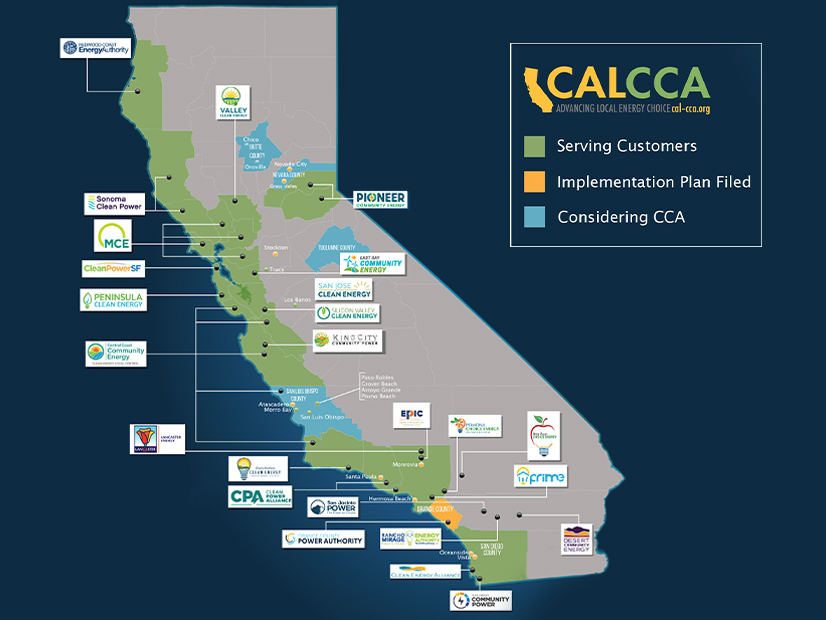A group representing California’s community choice aggregators is asking regulators to reconsider a decision that blocks CCAs from expanding if they have had resource adequacy deficiencies in the past two years.
The California Public Utilities Commission on July 5 issued the decision, which adopts local capacity obligations for 2024 to 2026 and refines the commission’s resource adequacy program.
The California Community Choice Association (CalCCA) filed a rehearing request Wednesday, saying the decision contained numerous “legal errors.”
CalCCA argues that the CPUC exceeded its jurisdiction over CCA implementation plans and impaired customers’ right to aggregate their loads with a CCA. The commission failed to act in a nondiscriminatory manner by prohibiting expansion of CCAs and electric service providers, but not investor-owned utilities, CalCCA said.
“The CPUC has given itself new unauthorized powers to needlessly discriminate against CCAs and prevent their growth,” CalCCA Executive Director Beth Vaughan said in a statement. “The decision literally blocks communities from exercising their legal right to aggregate and provide customers with a choice of energy providers.”
California has 25 CCA programs in operation, serving more than 14 million customers. The CCAs buy electricity for participating communities, in place of investor-owned utilities, with an emphasis on clean energy.
RA Obligations
The CPUC said in its decision that load-serving entities (LSEs) have been failing to meet resource adequacy obligations. The decision said seven LSEs had month-ahead deficiencies in 2021 and five in 2022. Some LSEs have repeatedly failed to meet their RA obligations, the decision said.
“Even more concerning, some LSEs submitted implementation plans to expand their customer load by increasing their service territory, even as they have been unable to secure sufficient capacity to meet their RA obligations and serve their existing customers,” the decision said.
Under the decision, an LSE isn’t allowed to expand its service territory if it hasn’t complied with RA requirements in the previous two calendar years. A deficiency doesn’t count toward the expansion ban if it’s less than 1% of the LSE’s requirements.
The restriction applies to a CCA’s expansion of its service territory, not to growth within its existing territory.
The CPUC decision addresses the nondiscrimination issue by noting that investor-owned utilities are providers of last resort and therefore legally distinct from other LSEs.
CalCCA said the CPUC may or may not rule on its rehearing request. If there’s no ruling by Sept. 26, the request is considered denied. The group said it would then decide whether to take the issue to a state appeals court.
Penalty System
The CPUC sets resource adequacy obligations for LSEs that are enforced through citations and fines.
In a previous decision, the CPUC added a point accrual system to the program’s penalty structure to increase penalties when an LSE repeatedly falls short of RA obligations.
CalCCA said newer market entrants such as community choice aggregators and direct access providers are hardest hit by resource shortages. In contrast, investor-owned utilities have “legacy” supplies, the group said in a resource adequacy section on its website.
CalCCA said the CPUC should do more to address the RA problem.
“RA penalties for LSEs unable to secure supply in a deficient market do nothing to get new resources in the ground, and they unnecessarily add to customer costs and indirectly increase the cost of supply,” CalCCA said.




